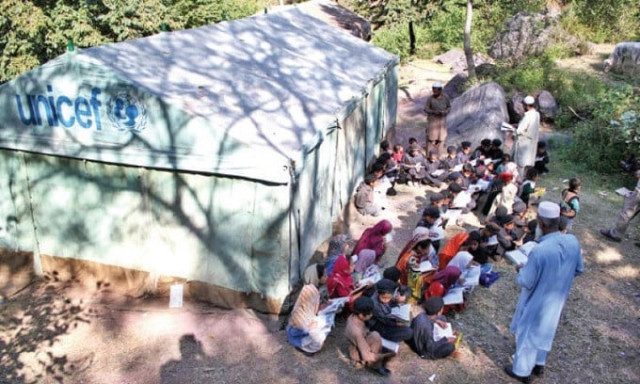Oct 8 quake victims remembered
Pakistan is ranked as 8th most vulnerable country to extreme weather events on the Global Risk Index

Provincial Disaster Management Authority (PDMA) Khyber-Pakhtunkhwa in collaboration with the Glacial Lake Outburst Flood Project (GLOF-II Project) Friday observed ‘National Resilience Day’ at University of Swat in memory of martyrs of October 8, 2005 earthquake.
The objective of the event was to express solidarity with the bereaved families who lost their family members in the tragic calamity. Chief Guest Additional Secretary Ministry of Climate Change and Project Director GLOF-II Judat Ayaz said on the occasion that the purpose of observing the day is to raise awareness on the devastating impacts of climate change induced disasters with a special focus on disaster resilience.
He said that considering the fact that Pakistan is ranked as 8th most vulnerable country to extreme weather events on the Global Risk Index, working towards building a disaster resilient Pakistan is a key priority of the government. Currently, he said seven million people in Pakistan are vulnerable to GLOFs resulting from climate change, adding that initiatives such as the GLOF-II Project show our commitment towards building a more disaster resilient Pakistan.
He said that GLOF-II Project is sponsored by Green Climate Fund and jointly implemented by UNDP, federal ministry of Climate Change and Government of Khyber-Pakhtunkhwa.
He said the project aims to further empower communities to identify and manage risks associated with GLOFs and related impacts of climate change, strengthen public services to lower the risk of disasters, and improve community preparedness and disaster response capacities while targeting eight districts in K-P. Speaking on the occasion Director Disaster Risk Management Zuhra Nigar recalled the devastations caused in the 2005 earthquake and said that the commemoration of the day was aimed to create awareness among stakeholders about disaster risk reduction and disaster risk management.
She said that the Authority also intended to involve all stakeholders to make Disaster Resilient Khyber-Pakhtunkhwa.
She added that risk and uncertainties are increasing in the region due to climate change, greater frequency of extreme climatic events, extreme minimum and maximum temperature and increased incidence of temperature influenced disasters and pests.
The world in general and Pakistan in particular is suffering as a result of climate change, she noted and said that due to uneven distribution of monsoon rains, floods and famine are the fate of this region. In addition to these hazards, GLOF is another emerging phenomenon, observed especially in Chitral District having a glacial cover of 4000 sq km, the second largest glacial inventory in Pakistan after Gilgit and Baltistan. The incidents of GLOF have posed some serious threats and challenges to the mountainous communities in the far-flung areas in recent times, she warned. The director further said, today many people of our province are living in earthquake and disaster prone regions and many communities are at risks from cyclone and other extreme weather events. “If we are going to defeat climate change and address its impacts, we need to work together and PDMA is trying its best to achieve the goal of resilience in Khyber-Pakhtunkhwa,” National Project Manager GLOF -II Misbah Zafar said. He maintained that climate change impacts like glacial lake outburst floods pose a direct threat to local communities in Pakistan.
Published in The Express Tribune, October 9th, 2021.



















COMMENTS
Comments are moderated and generally will be posted if they are on-topic and not abusive.
For more information, please see our Comments FAQ